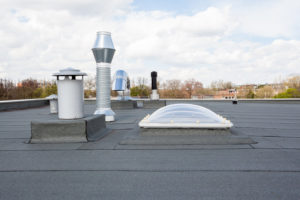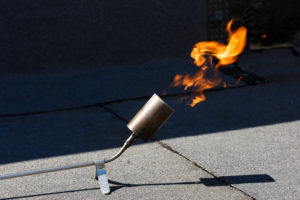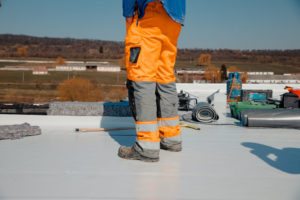Category: Commercial
Who to Hire for Installing TPO Roofing in Connecticut

The acronym TPO stands for thermoplastic polyolefin, a single ply membrane roofing material that is today equally common on commercial and on residential properties and that comes with lots of great benefits, such as durability, resistance to the elements as well as energy efficiency due to the material’s superior ability to reflect solar heat. TPO roofing is also uncomplicated when it comes to installation, but even so, you need a professional to install your new TPO roof. Here are some features that you should be looking with your TPO roofing contractor:
- Experience handling the material – any kind of roofing material requires expertise when it comes to correct installation. This means that the roofer you hire should be able to prove that they have worked on lots of TPO projects before accepting yours.
- Excellent reputation – having the knowledge to handle your roofing project is an important aspect, but not the only one. Your roofer needs to be reliable in every other aspect as well, including deadlines, the accuracy of cost estimates under willingness to provide consultation and to answer whatever question you might have about your roof.
- Licensing status – you should never work with a roofer who does not carry a state license and who is not properly insured.
Get some of the best in commercial roofing services at https://www.nemasonry.com/new-england-roofing in Connecticut.
Is TPO Roofing Considered the Most Resilient Type of Commercial Roofing Material?

TPO roofing (Thermoplastic Polyolefin roofing) is a single-ply roofing membrane usually used for commercial roofing. It entails a single layer of synthetics to cover flat roofs but is considered the most resilient type of commercial roofing in Connecticut material.
After cleaning or removing the existing and before installing the TPO, one must decide upon an insulation option such as:
- Polysio
- EPS
- XPS
The first option is more expensive but has a high R-value rating. The second one does not retain water over time, and the last one is semipermeable with a perm rating of one. It is also known for its specific coloring: pink, blue or green. After choosing an insulation option, the TPO membrane is mechanically fastened to the cover board using a bonding adhesive. The seams are, then, hot-air welded together.
The price of TPO roofing ranges from three to seven dollars per square foot. Moreover, TPO membranes can last up to twenty-five years and are fire-resistant. They are also naturally reflective. The bright white color reflects light and heat from the building so that the interior can be easily cooled down during summer. The only flaw of the TPO membrane is that it can be punctured, and its seams can be ripped open. In such cases, a silicone restoration can be carried out to strengthen the seams with a silicone coating.
What Is the Best Schedule for Roofing Maintenance?

Mostly any homeowner will have to deal with roof replacement or repair at a certain moment in life. The reason may be either the old age of the roof or a major weather event such a hailstorm or other natural hazard. Nonetheless, there are certain maintenance tips which can help you prolong the lifespan of your roofing system.
While there isn’t really a “best schedule” for roof maintenance, one smart thing to do is check on the state of your roof from time to time, at least once every season and after storms, to see if there are any missing shingles or other elements which got affected by natural wear and tear, harsh winds, and so on. Having your roof inspected by a professional team at least twice per year is the perfect choice. They would typically look if there is any loss of shingles, if they are curling, cracked, etc. The flashing may be peeling or there can be missing granules.
A professional commercial roofing Connecticut roofer would certainly be able to detect issues which you may not. Moreover, he can offer you valuable advice on how to maintain your roof properly, and what to do to fix any problems. Checking for leaks in your ceiling or in the attic is another important part of your regular maintenance program. Cleaning your gutters and washing your roof are also very important tasks.
How Does Commercial Roof Maintenance Differ from Residential Roof Maintenance?

When it comes to roof maintenance, the differences between taking care of an EPDM roofing installation and maintaining a regular residential sloped roof can be extensive. Commercial roofing systems can be a lot more demanding sometimes, but depending on their construction they can also be somewhat simpler and less problematic to deal with.
The main difference is the structure. While some flat roofs used as part of commercial roofing installations are simple and straightforward, residential roofs have a more complex layout and structure, with an interior framework that has to keep the roof supported.
On the other hand, commercial roofs can be larger and more elaborate than any typical residential roof you will encounter. The maintenance tasks they require can be somewhat extensive, and some might deal better with hail and rain than others. Moreover, because of the differences between how various materials perform and what types of coatings and other additions they might require to work properly, commercial roofers often have their fair share of difficulties to deal with during maintenance.
Your best choice to avoid the pitfalls of commercial roof maintenance and make sure your roof can withstand the test of time is to contact a local commercial roofing CT roofer, set up a meeting with them and discuss your options in terms of yearly roof inspections and maintenance plans.
Is TPO Roofing Durable Enough for Your Commercial Building?

TPO is the acronym for thermoplastic polyolefin, a roofing material which has become very popular in the past decades due to its numerous advantages.
TPO membranes are recommended especially for flat roofs. They are flexible and resistant, renowned for their capacity to resist dirt accumulations and mold. Made to reflect UV rays, TPO membranes are very energy-efficient. Moreover, in colder climates, TPO can actually absorb heat.
TPO commercial roofing CT systems are very adaptable and durable. At the same time, this material is quite affordable, which makes it one of the most preferred types of material for commercial building owners and not only.
Purchasing a roofing warranty is an essential step to take when building mostly any kind of roofing system, including the one using the TPO membrane. The usual warranty period is that of 15 to 30 years. Leaks or other minor damages are easy to fix in the case of a TPO roof. The warranty is likely to pay for itself, so that you probably will not have to worry about that all throughout your roof’s life.
At any rate, it is more than recommended to discuss all your roof-related concerned with an experienced roofing team before starting the roof installation per se.

















